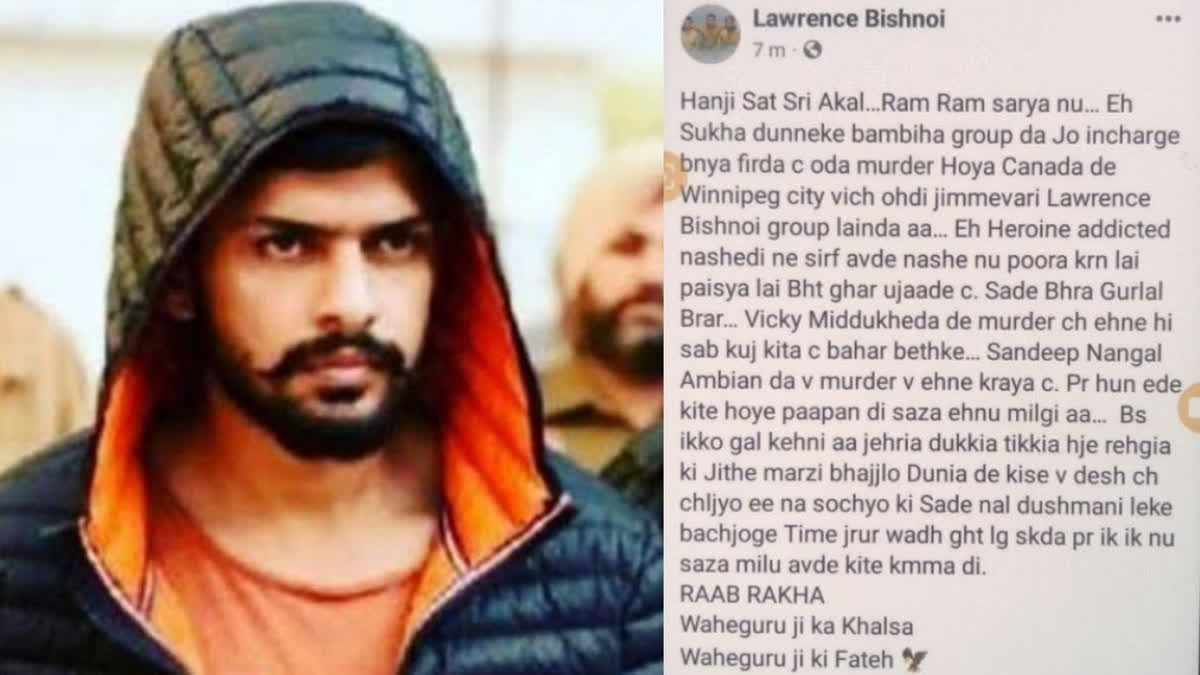New Delhi: In a startling turn of events, incarcerated gangster Lawrence Bishnoi has taken responsibility for the recent killing of Khalistani terrorist Sukhdool Singh, also known as Sukha Duneke, in Canada. This shocking revelation comes amidst escalating diplomatic tensions between India and Canada, following Canadian Prime Minister Justin Trudeau's claims of "credible allegations" linking Indian government agents to the assassination of another Khalistani terrorist, Hardeep Singh Nijjar, on Canadian soil earlier this year.
Sukha Duneke, a "Category A" gangster hailing from Punjab's Moga, had been living in Canada under a fake passport since 2017. He was closely associated with gangster and Khalistani terrorist Arshdeep Dalla. Notably, Duneke's name appeared on a list of 43 gangsters with ties to Khalistan and Canada released by India's anti-terror agency, the National Investigation Agency (NIA), just a day before his death.
Bishnoi's gang, through a Facebook post, claimed responsibility for the murder of Sukha Duneke, who served as the leader of the Banbiha group in Canada's Winnipeg. The post alleged that Duneke had been involved in multiple murders, including those of their associates Gurlal Brar and Vicky Middukheda. Furthermore, it described Duneke as a "drug addict" who had met his karmic retribution for his sins. The gang warned that other members of the Bambiha group in hiding would not be spared either.
Also Read: Khalistani Terrorist Sukha Duneke Killed in Canada Amidst Diplomatic Row with India
The killing of Sukha Duneke has added a new layer of complexity to the already strained relations between India and Canada. Prime Minister Justin Trudeau's assertion of Indian government involvement in the assassination of Hardeep Singh Nijjar, a prominent Khalistani terrorist and leader of the banned Khalistan Tiger Force (KTF), had sent shockwaves through diplomatic circles. Nijjar was shot and killed outside a gurdwara in Surrey, British Columbia, in June, and had been on India's most-wanted list with a substantial bounty on his head.
The fallout from Trudeau's allegations led to both countries expelling one senior diplomat each, a clear indication of the rising tensions. India vehemently denied the allegations, labelling them as "absurd" and "motivated."
Also Read: India-Canada row: Hardeep Singh Nijjar's ancestral house put under lock
In response to the escalating tensions, India issued a travel advisory for its citizens in Canada, cautioning them about the increase in anti-India activities and "politically-condoned hate crimes" in the country. The advisory specifically mentioned threats against Indian diplomats and members of the Indian community who opposed the anti-India agenda.
Amidst the ongoing diplomatic standoff, Punjab Police launched a comprehensive crackdown on associates of gangster Goldy Brar, who is suspected of having close ties to the Khalistani separatist movement and is believed to be hiding in Canada. This operation aims to dismantle Brar's network and address concerns about the growing influence of such elements within the Sikh community.
The killing of Sukha Duneke and the subsequent diplomatic rift between India and Canada have thrust the issue of Khalistani extremism back into the international spotlight. It raises critical questions about security, international cooperation, and the delicate balance between preserving cultural identity and ensuring national security.



